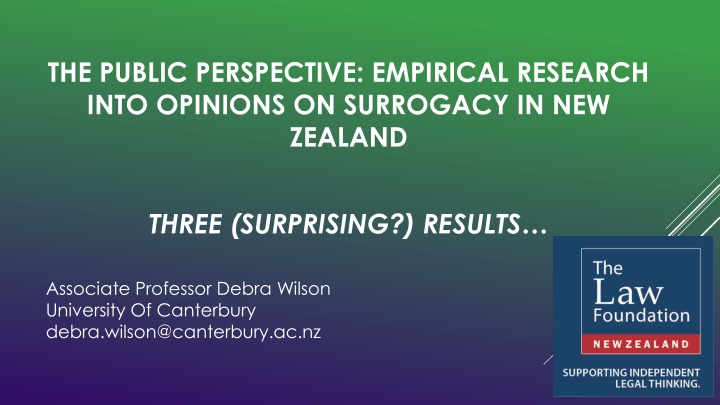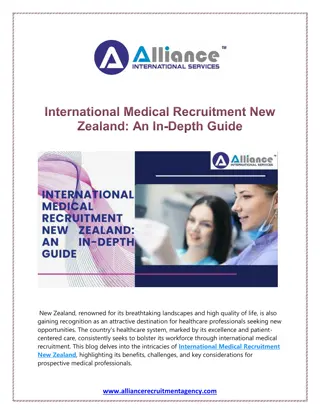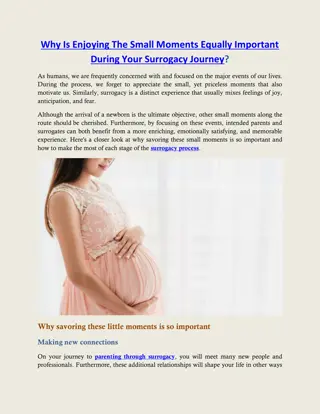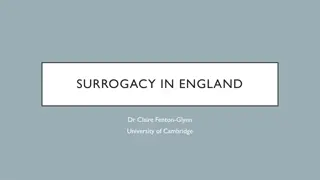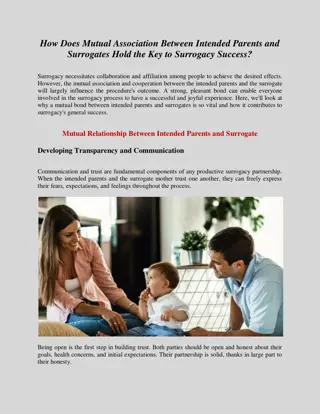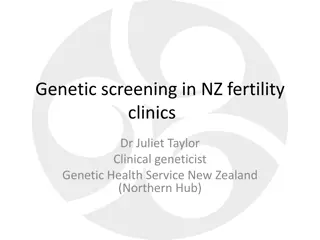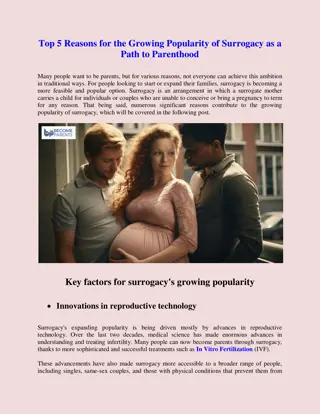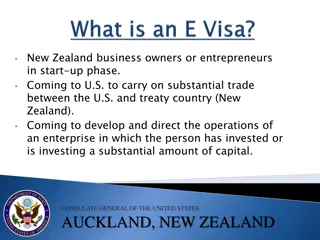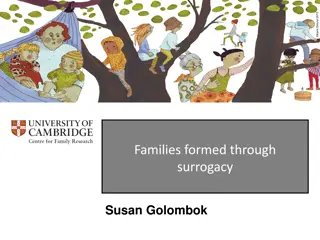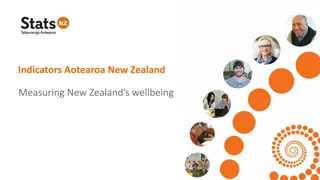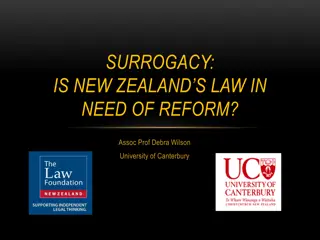Empirical Research on Surrogacy in New Zealand: Key Findings
Associate Professor Debra Wilson from the University of Canterbury in New Zealand conducted empirical research on public opinions regarding surrogacy. The findings revealed three surprising results, including perspectives on surrogates being compensated, the importance of genetics in surrogacy arrangements, and societal views on genetic links between intended parents and children. The study also explored the legality and regulation of surrogacy in New Zealand, highlighting the need for ECART approval for fertility clinic procedures. These findings provide valuable insights into public perceptions and attitudes towards surrogacy in the country.
Download Presentation

Please find below an Image/Link to download the presentation.
The content on the website is provided AS IS for your information and personal use only. It may not be sold, licensed, or shared on other websites without obtaining consent from the author.If you encounter any issues during the download, it is possible that the publisher has removed the file from their server.
You are allowed to download the files provided on this website for personal or commercial use, subject to the condition that they are used lawfully. All files are the property of their respective owners.
The content on the website is provided AS IS for your information and personal use only. It may not be sold, licensed, or shared on other websites without obtaining consent from the author.
E N D
Presentation Transcript
THE PUBLIC PERSPECTIVE: EMPIRICAL RESEARCH INTO OPINIONS ON SURROGACY IN NEW ZEALAND THREE (SURPRISING?) RESULTS Associate Professor Debra Wilson University Of Canterbury debra.wilson@canterbury.ac.nz
THE SURROGACY PROCESS IN NZ Unregulated if private , except for need to transfer parentage through adoption laws Regulated through Human Assisted Reproductive Technology Act 2004 if want to use fertility clinic. This requires ECART approval: Fertility Clinic counselling Medical reports Legal advice Ethics Committee approval, based on Advisory Committee Guidelines Adoption
THE EMPIRICAL RESEARCH Fertility Clinics Lawyers Survey Judges Interviews Public Perceptions Survey
FINDING ONE: WHY SHOULDN T SURROGATES GET PAID? FOR SOME WOMEN GETTING PREGNANT IS THEIR SUPERPOWER SHOULD DOMESTIC SURROGACY (IE WHERE INTENDED PARENTS AND THE SURROGATE MOTHER ALL LIVE IN NEW ZEALAND) BE LEGAL? (532 RESPONDENTS)
54.5%: Yes, compensated 27.6%: Yes, commercial 8.9%: Unsure 6.6%: Yes, altruistic 3%: No Did these results change if respondents were filtered by age? Level of education? Ethnicity? Gender? Identification with religion? Previous experience with fertility treatment? Was there anything to learn from the Fertility Clinics, Lawyers, ECART or Judges?
FINDING TWO: GENETICS IS NOT IMPORTANT UNTIL IT IS
WHEN ASKED DIRECTLY WHETHER THERE SHOULD BE A REQUIREMENT OF A GENETIC LINK BETWEEN INTENDED PARENTS AND CHILD 47.2% of respondents answered NO 39.6% of respondent answered YES Which groups in society saw a genetic link as more important?
WHEN ASKED INDIRECTLY Many will default to genetics as a way of resolving issues Question: Who should the legally recognized parents be? Question: Can parties cancel the contract/surrogacy arrangement?
FINDING THREE: BRINGING A NEW PERSON INTO THE WORLD IN SUCH A DELIBERATE FASHION SHOULD NOT BE A CHANGED MY MIND SITUATION THIS IS NOT A PLAYDATE- YOU DON T CANCEL WHAT IF THE SURROGATE CHANGES HER MIND? WHO SHOULD COURT GRANT CUSTODY TO?
51.8%: Custody to Intended Parents 15.7%: Custody to Surrogate 12.8%: Joint Custody 6.7%: Other Did these results change if respondents were filtered by age? Gender? Identification with religion? Previous experience with fertility treatment? What other comments did the participants have?
Thank You! (Full Published Results Coming Soon)
